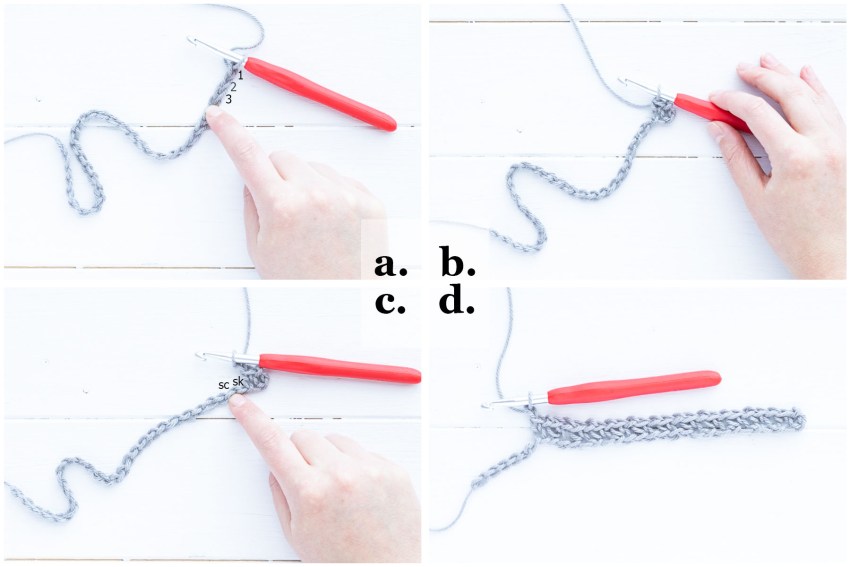I’ve got a new stitch tutorial for you today! For Day Nine of the newbie series, we’ll learn how to crochet the moss stitch (aka linen stitch aka granite stitch). This stitch alternates single crochets and chain stitches in order to create a woven texture in your project. You can use the linen/moss/granite stitch for almost anything, including sweaters, blankets, and dishcloths.
NOTE: This tutorial utilizes US terminology.

Disclaimer: Please note that some of the links contained in this post are affiliate links. If you make a purchase through one of the links, you will pay the same prices as always, but You Should Craft will receive a small commission that helps us provide free crochet patterns. As an Amazon Associate, I earn from qualifying purchases.
After today’s post and video tutorial, you’ll be able to:
- Crochet the moss stitch (linen stitch)
- Identify the skip abbreviation in patterns
- Describe what ** represents in patterns
- Locate and crochet into the “chain space”
Are you a new crocheter? Join our 30-day Newbie Series to receive daily tutorials, simple patterns, and round-ups that will teach you how to crochet. Sign up here: ⬇️⬇️
Today, we’re combining combining two crochet techniques we’ve already learned (single crochets and chains) in order to crochet the linen stitch. This is pretty easy to do (some might argue that it’s easier than standard single crochets), but we do have some new vocabulary to learn: “skip” and “chain space.” We also have new pattern notation to learn.
Skips, Chain Spaces, and *Repeats*
Skips (sk)
First up, skips! To skip a stitch (or chain) means that we won’t crochet into it. Today, you’ll chain one to keep your stitch count, but sometimes (like in my Mystic Ripple Blanket) you’ll combine skips with a series of increases and decreases in order to maintain your stitch count. If we didn’t chain or increase, our rows would gradually get smaller
In patterns, skip will be abbreviated as “sk.” When crocheting the linen stitch, we chain one and skip the single crochets from the previous row. You’ll see this written as: ch 1, sk 1
Chain Space
Next, you’ll see the term “chain space,” which represents the small space below the chain. When you crochet into the starting chain, you insert your hook into one of the loops on the chain. When crocheting into the chain space, you’ll crochet *below* the chain. It’s actually way easier because chains can get tight sometimes, but the chain space is roomy AF.
*Repeat*
Sometimes written patterns have repeated sections. In the linen stitch, you’ll repeat a ch 1, sk 1, sc sequence for the entire row. You’ll see this written as:
*ch 1, sk 1, sc* until the end of the row
or
*ch 1, sk 1, sc* repeat from * 14 times
The asterisks mean that you will repeat the section between them, over and over. Sometimes patterns will tell you how many times to repeat the section, and other times they’ll just say “until the end of the row.”

Linen Stitch / Moss Stitch / Granite Stitch Chart
In stitch charts, a skip doesn’t have a special symbol. You’ll know to skip a stitch because there won’t be another stitch on top of it. In the linen stitch chart below, do you see the chains within the rows? Those are the skipped stitches.

To start the linen stitch, you’ll crochet into the fourth chain from your hook, which means that you’ll need to chain two extra in your starting chain. In the stitch chart above, the blue starting chain has 32 chains, and row 1 has 30 stitches. Those extra chains are used to create the first ch 1, sk 1 in the row.
Another difference between standard single crochets and the linen stitch is the length of the turning chain. Typically, we would ch 1 and turn at the start of an sc row. For the linen stitch, we’ll start each row with a ch 2.
A written pattern would combine all this information and might read:
- ch 32
- ROW 1: sc in fourth ch from hook, *ch 1, sk 1, sc* until the end of the chain (30)
- ROW 2: ch 2 and turn, sk 1, sc in ch space, *ch 1, sk 1, sc* until the end of the row (30)
Supplies / Materials
You can use any yarn/hook to crochet the linen stitch, so if you’re following along with the Newbie Series, either your worsted weight cotton or acrylic yarn will work for your practice swatches.
For the tutorial, I used:
NOTE: My friends at WeCrochet provided the materials for the Newbie Series.
How to Crochet the Linen Stitch – Video Tutorial
How to Crochet the Moss Stitch – Photo Tutorial
ch any even number (If you want to make a dishcloth tomorrow, ch 32)
ROW 1:
- a. & b.) sc in fourth ch from hook
- c. & d.) *ch 1, sk 1, sc* until you reach the end of the row
If you starting with a ch 32, you’ll have 30 stitches at the end of the row.

ROW 2:
- e.) ch 2, sk first stitch (you’ll crochet your first sc where I’m pointing – labeled “sc”)
- f.) sc in ch space
- g. – h). *ch 1, sk 1, sc* until you reach the end of the row (30 stitches, or two less than your starting ch)

ROWS 3 – ?: Repeat Row 2

